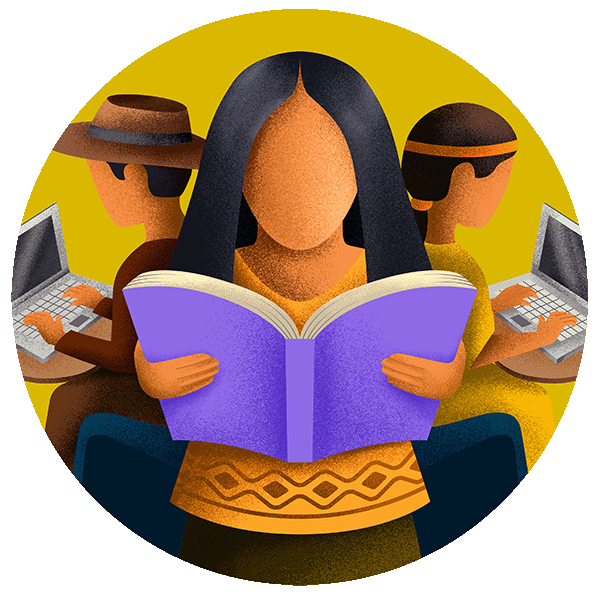
For Collaboration To Work, Western Scientists Must Respect Indigenous Scientists
What can Western science learn from Indigenous knowledge? We speak with Dr. Daniel Wildcat (Yuchi) and Tui Shortland (Maori) about the value of Indigenous longitudinal place-based knowledge that Indigenous People have gathered over millennia. We unpack what positive collaboration between Western science and Indigenous science can look like and why it is important.
Credits:
Background music:
"Atahualpa" and "Lights in the forest" by Yarina. Used with permission.
Indigenous Women - Knowledge Holders, Responders To Climate Change
Can traditional knowledge from Indigenous communities provide us with answers to fighting climate change? We speak with Andrea Carmen (Yaqui), Executive Director of International Indian Treaty Council. She speaks about how Indigenous women are very strong voices in the work for the protection of the environment, through their role as food producers, knowledge holders, and the first teachers of children.
Climate Change Takes Water And Milk From Mbororo People
In Mbororo communities in Chad, Indigenous women are the most affected by climate change because they are the ones collecting food, water, and traditional medicines for their families. Changes to their environment have cause increased hardship on the Mbororo who are pastoralist cattle headers, as they are forced to move more frequently to cope with increasing drought conditions.
Indigenous Science Is Needed To Change Course for the Planet
What is the role of Indigenous Peoples in the current climate crisis? What responsibility do Indigenous Peoples feel towards Mother Earth today? Listen to three Indigenous women leaders give their perspectives on their feeling of the interconnection between all living things and our planet in the face of climate change, and what they feel should be done with that knowledge.
Reforestation Model From Philippines Indigenous Communities
Lakes and forests in the Mt. Talinis area of the Phillipines are under threat from recent expansions of the energy industry. Apolinario Carino is working with the organization PENAGMANNAK, a federation of 17 Indigenous Peoples’ community groups, to pioneer community management strategies of reforestation designed to empower the Indigenous groups to shape the future of their lands. Apolinario hopes to share the knowledge that they have gained from these experiences in order to better combat climate change on a global scale.
Indigenous Kani Efforts To Promote Indigenous Medicinal Knowledge In India
Indigenous communities often hold invaluable knowledge about medicinal plants and healing practices rooted in the environment and resources of their traditional homelands. Anoop Pushkaran Krishnamma is working with the Kerala Kani Community Welfare Trust in partnership with Indigenous communities in India to record and preserve this knowledge, allowing for healing practices to be utilized by future generations.
MUSIC
"Remember Your Children," by Salidummay. Used with permission.
Introduction: "Burn Your Village to the Ground" by A Tribe Called Red. Used with permission.
Indigenous Community Initiatives In Liberia Model Improved Livelihoods
Ezekiel Tye Freeman is the executive director of Green-PRO, which helps Liberian communities develop sustainable livelihoods for self-reliance. Beekeeping training programs, for example, offer a lucrative and environmentally friendly economic alternative to mining or slash-and-burn farming for individuals. Freeman points to high levels of unemployment among Liberia's Indigenous population as a major problem that his organization wants to attempt to alleviate.
Community Octopus Reserves In Madagascar For Food + Economic Sovereignty
George ‘Bic’ Manahira describes how his community established the
world's first community-run octopus, sea grass, and mangrove reserve in partnership with Blue Ventures, a UK-based NGO, in order to strengthen the traditional sea-resource-based livelihood of the coastal Indigenous communities in Madagascar. They hope to expand and improve on the model in collaboration with other Indigenous groups and leaders in the coming years.
Indigenous Agroforestry Protects Water, Biodiversity, + Food Sovereignty
The Kalinga Mission for Indigenous Children and Youth, led by Donato Bumacas, promotes values of biodiversity conservation, with the goal of poverty reduction. These values are upheld using Indigenous traditional knowledge systems andd technologies to conserve and maintain the local forests. Sustainable Indigenous agricultural technology is implemented, with the goal of passing these systems down to future generations, as this knowledge was passed down to them.
Challenges And Solutions For Indigenous Fisheries in South Africa
Indigenous Rights Radio producer Shaldon Ferris (KhoiSan) investigates the impacts of fishing regulations on Indigenous groups who have fished as a part of their livelihoods for centuries. The Convention on Biological Diversity, an international agreement which has inspired the implementation of many current fishing regulations, specifically discusses the importance of collaborating with Indigenous communities in order to preserve cultural knowledge in the pursuit of ecological preservation.
